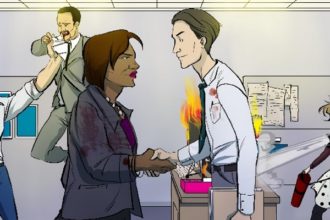Interview with Mike Selinker of Lone Shark Games
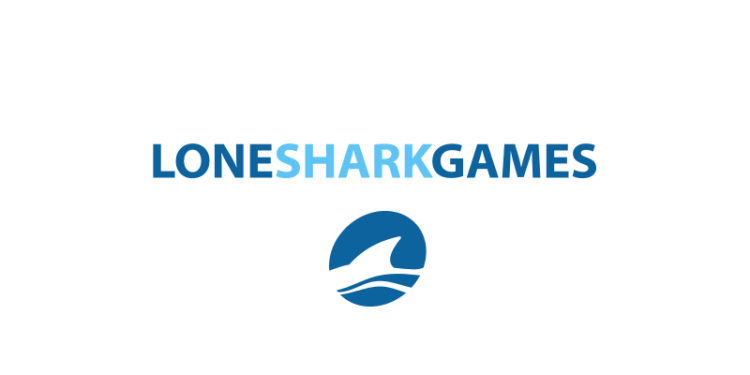
Today we have an interview from the prestigious Mike Selinker of Lone Shark Games. Here is a short bio about Mike from the Lone Shark Games website:
 Mike Selinker is the president and chief creative officer of Lone Shark Games. He’s the co-creator of the Pathfinder Adventure Card Game, Lords of Vegas, Unspeakable Words, and many other games, as well as the author of the books Puzzlecraft, The Kobold Guide to Board Game Design, and the interactive puzzle novel The Maze of Games. While at Wizards, he helped design and develop games like Betrayal at House on the Hill, Risk Godstorm, and Axis & Allies, and was a creative director on 3rd edition Dungeons & Dragons. He can be found onstage at events like w00tstock, manipulating the masses with ARGs like the Cards Against Humanity holiday game, and at @mikeselinker.
Mike Selinker is the president and chief creative officer of Lone Shark Games. He’s the co-creator of the Pathfinder Adventure Card Game, Lords of Vegas, Unspeakable Words, and many other games, as well as the author of the books Puzzlecraft, The Kobold Guide to Board Game Design, and the interactive puzzle novel The Maze of Games. While at Wizards, he helped design and develop games like Betrayal at House on the Hill, Risk Godstorm, and Axis & Allies, and was a creative director on 3rd edition Dungeons & Dragons. He can be found onstage at events like w00tstock, manipulating the masses with ARGs like the Cards Against Humanity holiday game, and at @mikeselinker.
This is a great interview from a smart & humble guy that I have had the fortunate opportunity to meet last year in Seattle at PAX West 2016 (he also signed my Maze of Games book.) With several impressive upcoming & completed projects, I thought it was a great time to reach out and ask a few questions that can help us understand his genius.
Starter Question: Mike, What’s your gaming ‘origin story’?
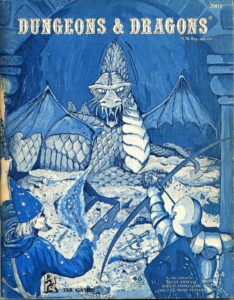 Oh, so starting out with only the last half-century? Shouldn’t be too hard to summarize in a couple sentences. OK, I started gaming at age 11 when my mom’s boyfriend gave me the blue box D&D basic set. My soon-to-be brother and friends rampaged through that, and then we devoured every other game we could find. I figured I could write them too, and by 15 I was seeing my puzzles and games appear in Games Magazine, Dragon, Polyhedron, and even some TSR products. I worked through college writing game stuff, all as a sideshow to my real career: being an investigative reporter and political operative in the crucible of Chicago. But even as I was dealing with the most serious issues of the world, I was always writing games. Eventually, I decided to make games my full-time deal, and I became a designer and creative director for Wizards of the Coast.
Oh, so starting out with only the last half-century? Shouldn’t be too hard to summarize in a couple sentences. OK, I started gaming at age 11 when my mom’s boyfriend gave me the blue box D&D basic set. My soon-to-be brother and friends rampaged through that, and then we devoured every other game we could find. I figured I could write them too, and by 15 I was seeing my puzzles and games appear in Games Magazine, Dragon, Polyhedron, and even some TSR products. I worked through college writing game stuff, all as a sideshow to my real career: being an investigative reporter and political operative in the crucible of Chicago. But even as I was dealing with the most serious issues of the world, I was always writing games. Eventually, I decided to make games my full-time deal, and I became a designer and creative director for Wizards of the Coast.
After 8 years of helming the coolest projects, I got disenchanted with working for a giant company, and started Lone Shark Games with James Ernest. It’s now a small company I run to make the games, puzzles, and events I want to play. It all turned out pretty cool.
What are some of your earliest sources of inspiration? What inspires you now?
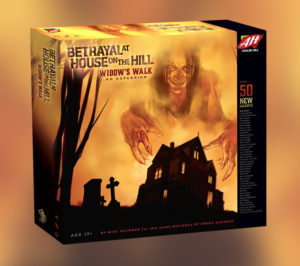 Perhaps a bit earlier than most, I realized that games had designers, so I began to seek them out. There’s a now legendary story of my first meeting with Gary Gygax that I won’t repeat here, but also I made sure that if I liked a game, a novel, a comic, or a song, and it was in my power to meet the person who made it, I would try to meet them.
Perhaps a bit earlier than most, I realized that games had designers, so I began to seek them out. There’s a now legendary story of my first meeting with Gary Gygax that I won’t repeat here, but also I made sure that if I liked a game, a novel, a comic, or a song, and it was in my power to meet the person who made it, I would try to meet them.
So I now have one hell of a friend-list. The people I know make the coolest things in the world. I often try to throw them into my projects, such as Wil Wheaton narrating the Maze of Games audiobook, or Pat Rothfuss and Jerry Holkins co-writing parts of Apocrypha, or Pendleton Ward and Anita Sarkeesian writing haunts for Betrayal’s Widow’s Walk expansion. We’re friends and collaborators, and I just try to hold up my part of the deal by making the coolest things in the world too.
What sorts of things do you make & and how would you summarize your career with tabletop gaming?
At WotC, I helped relaunch D&D, Avalon Hill, Axis & Allies, and Risk, worked on trading card games like Magic, Harry Potter, and Netrunner, and developed board games like Betrayal at House on the Hill.
With James, I made a lot of games such as Unspeakable Words and Lords of Vegas, and now we make the Pathfinder Adventure Card Game, Thornwatch, The Ninth World, and our new game Apocrypha. I’ve written The Kobold Guide to Board Game Design and the puzzle design book Puzzlecraft. Oh, and I created a puzzle novel called The Maze of Games in there too. I do a little bit of a whole lot of things.
Your youtube video ‘The 100 Games You Absolutely, Positively Must Know How to Play‘ has a lot of games, Would you make any changes or additions to your list since it came out at Pax East 2015?
OH MAN, I think about that all the time. There are a few obvious changes: Both Pandemic and Risk Legacy can be sidelined for Pandemic Legacy, for example, and Pokémon GO is going to unseat its sister Ingress. Codenames, Scythe, Overwatch, and That Dragon, Cancer are going to try to get on there. Hanabi, Warmachine, Nethack and System Shock 2 all want a place at the table. Maybe our game Lords of Vegas finally asks Acquire to step aside (sounds like blasphemy, though). I dunno. I will probably reissue it someday.
How has the board game industry changed for you over the years, and has it changed how you design games?
We’re kinda in charge now. People see our stuff as not just great, but equal to all other forms of art. That was not true at any time in my lifetime. I can now run a conference like PAX Dev, where all the game designers come to learn from each other, and not be dismissed as a lesser technician. It’s pretty great to be a game creator these days.
Where do you see the gaming hobby going from here?
I think we’ll stop using the term “hobby.” We’re in a whole lot of lives now.
I think board game cafes and stores will continue to expand, we’ll keep getting more great games, and we’ll just be something everybody does some of at some point in their lives. I’m down with that.
Can you tell us more about Lone Shark Games?
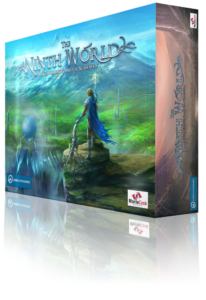 It’s a small company that’s been around for almost 14 years now. It has a powerhouse core of great game designers and creators—designers Chad Brown, Liz Spain, Rodney Thompson, Elisa Teague, Paul Peterson, Gaby Weidling, and Keith Richmond, editors Tanis O’Connor and Aviva Schecterson, graphic designer Skylar Woodies, event manager Shane Steed, and chief business officer Marie Poole all work with me in one capacity or another. We do three things regularly: We make our own games and puzzles (Apocrypha, The Maze of Games), we collaborator with other companies to make games with them (Pathfinder, Lords of Vegas, Betrayal, Thornwatch, The Ninth World, Disney World’s Sorcerers of the Magic Kingdom), and we make large scale puzzle and game events with companies like Bioware, Bethesda, Sony, Microsoft, and others. We keep very. very busy.
It’s a small company that’s been around for almost 14 years now. It has a powerhouse core of great game designers and creators—designers Chad Brown, Liz Spain, Rodney Thompson, Elisa Teague, Paul Peterson, Gaby Weidling, and Keith Richmond, editors Tanis O’Connor and Aviva Schecterson, graphic designer Skylar Woodies, event manager Shane Steed, and chief business officer Marie Poole all work with me in one capacity or another. We do three things regularly: We make our own games and puzzles (Apocrypha, The Maze of Games), we collaborator with other companies to make games with them (Pathfinder, Lords of Vegas, Betrayal, Thornwatch, The Ninth World, Disney World’s Sorcerers of the Magic Kingdom), and we make large scale puzzle and game events with companies like Bioware, Bethesda, Sony, Microsoft, and others. We keep very. very busy.
What are the different challenges/opportunities with working with your own publishing company versus your work with other publishers?
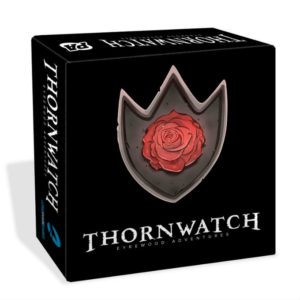 I could, and might, write a book about this. But basically: We’re very good at synthesizing what is cool about someone else’s work and figuring out exactly what needs to be done to make the greatest play experience.
I could, and might, write a book about this. But basically: We’re very good at synthesizing what is cool about someone else’s work and figuring out exactly what needs to be done to make the greatest play experience.
Thornwatch is a great example: Mike Krahulik and Jerry Holkins had concepts for a world, a few comic series, and a skeleton of an awesome game. We came in and worked with them to make a whole lot of more of all of that. Now the game feels like it’s as much our creation as theirs, and we all like that quite a bit.
When we’re doing that on our own stuff, we have to cut the cloth ourselves. Often I will just burrow underground for a while and come up with something we can all dissect and warp to our mutual desires. It’s very rarely “my game” for long.
I am super excited about the hybrid board game/RPGs Thornwatch & Apocrypha, can you tell us more?
How should the RPG community approach these games?
I’d like them to think these are real RPGs, not just card game engines with some RPG trappings.
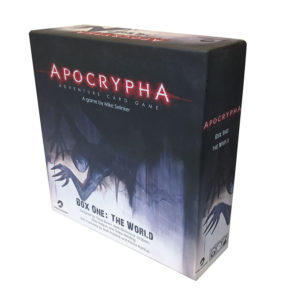 Apocrypha is a game that can be played as a board game or an RPG, and you can hop back and forth between those modes in your campaign. In the game, the players play saints, people who can see the monsters in our modern world. They are powerful heroes who’ve forgotten all about what they can do, and have to unlock their memories to become the person they once were. The RPG games of Apocrypha that I’ve run have been some of the best sessions I’ve played, in no small part because the mechanical side of the game kinda runs itself once you wind it up and set it in motion.
Apocrypha is a game that can be played as a board game or an RPG, and you can hop back and forth between those modes in your campaign. In the game, the players play saints, people who can see the monsters in our modern world. They are powerful heroes who’ve forgotten all about what they can do, and have to unlock their memories to become the person they once were. The RPG games of Apocrypha that I’ve run have been some of the best sessions I’ve played, in no small part because the mechanical side of the game kinda runs itself once you wind it up and set it in motion.
Thornwatch is also in the card game/RPG fusion space, but it’s very likely to be a lot of people’s first RPG-like game, and there will likely be more of this type of guided game in the future. In it, you play ghostly spirits of vengeance who are summoned by the inhabitants of a magical forest to ward off evil and save lives. The Eyrewood isn’t somewhere I’d want to live, but it’s a great place to be a savior from beyond.
You have had some incredible success using crowdfunding. How has crowd funding shaped the way you publish, and what role do you see it playing for you/Lone Shark Games in the future?
It’s allowed us to make what we want in our own way. We can keep the lights on in part because of our work with other companies, and in part because backers have entrusted us with their money to make great games and books. We’ve decided not to run any big campaigns in 2017 because we have some things to finish first: The Maze of Games and Apocrypha are out, The Ninth World’s at the printer, and Thornwatch will follow soon. But I’m sure we’ll be back on Kickstarter in 2018 with some fascinating new things.
What are you planning for the future of Lone Shark Games? Can you talk about what you’re working on now/upcoming projects?
Apocrypha‘s going to have several more box sets, we’re making more Pathfinder as long as they let us, and of course Thornwatch is part of an entire Eyrewood line. I have a Titan Series game for Calliope I’m kicking into gear soon. And I also wrote an email last week which detailed all the games we’re going to work on in the near future. It’s a pretty amazing list, involving some new collaborators who have made some of my favorite games of all time. And that’s all I’ll say about that.
What would you like your legacy as a maker to be?
My legacy is in the people I collaborate with. I’ve opened the door for a lot of people to be game designers, including diversifying the hobby in what I think are some important ways. Sure, people will say “I played the new Mike Selinker game,” and that’s neat. But it’s the new Liz Spain game, the new Mike Krahulik game, the new Javier Quintero game. And what those people make after they work with me I’ll get to say “I played their new game,” and I’ll get to know that a little piece of me is in their too.
How do your personal values shape your work?
I am a voracious social and political machine. I write constantly about the world and how it functions, and I try to steer it gently toward how I want it to function. My co-designer Gaby and I formed an organization called Basket of Adorables which produced a political children’s book called The Ghastlytrump Tinies with all my favorite artists, and we organized game designers to stand up for candidates that make positive change in the world. Some people don’t like that, and they’ve made it known in very public and unlikable ways. I’m sure I’ll get over it.
What advice would you give to fledgling game makers?
I always answer this question the same way: “Be the person known for that thing.”
That is, make a thing, make sure people know about it, and then when people say, “Hey, are you the person who made that thing?” you can say “Why yes, I am.” Quite likely, you will start being known for lots of things.
Mike, was there anything I forgot to ask or you would like to add?
Those were a lot of questions! But you forgot to ask about how adorable my dog Guybrush is. So I should answer your question for you. Yes, he is quite adorable.
Thank you Mike for your time and answering all of my questions. I am so very happy for all of your success, and wish you much more in the future. ~ Michael

